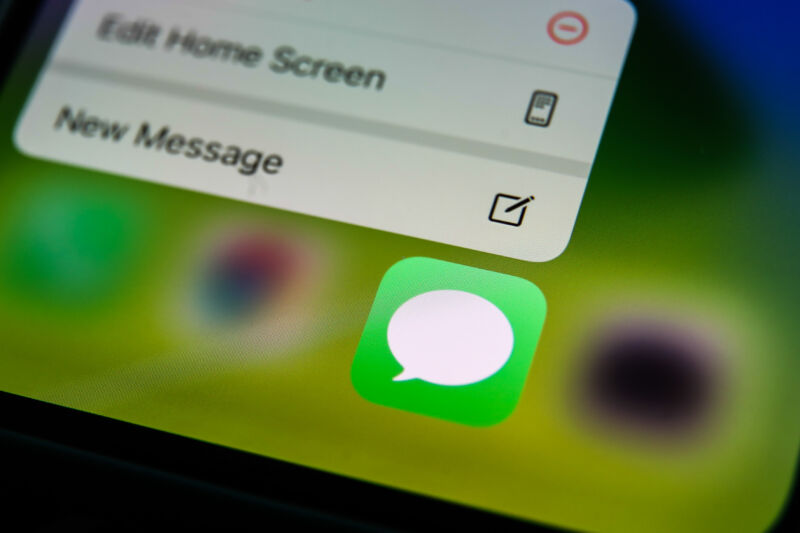
Getty Images | NurPhoto
The US Department of Justice is angry about green message bubbles. Announcing today’s antitrust lawsuit against Apple, US Attorney General Merrick Garland devoted a portion of his speech to the green bubbles that appear in conversations between users of iPhones and other mobile devices such as Android smartphones.
“As any iPhone user who has ever seen a green text message, or received a tiny, grainy video can attest, Apple’s anticompetitive conduct also includes making it more difficult for iPhone users to message with users of non-Apple products,” Garland said while announcing the suit that alleges Apple illegally monopolized the smartphone market.
The attorney general accused Apple of “diminishing the functionality of its own messaging app” and that of messaging apps made by third parties. “By doing so, Apple knowingly and deliberately degrades quality, privacy, and security for its users,” Garland said. “For example, if an iPhone user messages a non-iPhone user in Apple Messages, the text appears not only as a green bubble, but incorporates limited functionality.”
When messages are presented in those telltale green bubbles, “the conversation is not encrypted, videos are pixelated and grainy, and users cannot edit messages or see typing indicators,” Garland said. “As a result, iPhone users perceive rival smartphones as being lower quality because the experience of messaging friends and family who do not own iPhones is worse—even though Apple is the one responsible for breaking cross-platform messaging.”
Garland mentioned a 2022 interview in which Apple CEO Tim Cook “was asked whether Apple would fix iPhone-to-Android messaging.” The person asking the question said, “not to make it personal, but I can’t send my mom certain videos.” Cook responded, “Buy your mom an iPhone.”
Apple touts planned RCS support
The DOJ lawsuit in US District Court for the District of New Jersey also mentions the Cook remark. The case is about more than just green bubbles and text messaging, of course. The DOJ alleges that Apple violated antitrust laws by restricting rivals’ access to iPhone features and monopolizing the smartphone market. Messaging is one of several technologies that the DOJ points to in the antitrust complaint.
Garland’s green-bubble remarks echoed complaints made by Android maker Google over the last few years. Apple today disputed the DOJ’s entire lawsuit and said the department doesn’t appear to understand how encryption in messaging works.
In a background briefing with reporters, Apple spokespeople touted the company’s recent announcement that it will support the RCS messaging standard for iMessage sometime during 2024. In order to attend Apple’s briefing and view a background document, we had to agree to paraphrase the company’s remarks instead of quoting them directly.
Apple clarified that it is not implementing RCS as it exists today because it doesn’t believe the standard offers enough privacy and security. Apple said it is working with a standards body—this is likely a reference to the GSMA—to ensure that the version of RCS it eventually implements will support encryption and strong privacy and security.
Apple said that once it adopts RCS, iPhone and non-iPhone users will be able to exchange messages with higher-resolution photos and videos, and will experience improved group texting. Apple said it hasn’t brought its own message app to non-Apple devices because the user experience wouldn’t meet the company’s standards and that it cannot ensure that a third-party device’s encryption and authentication are secure enough.
